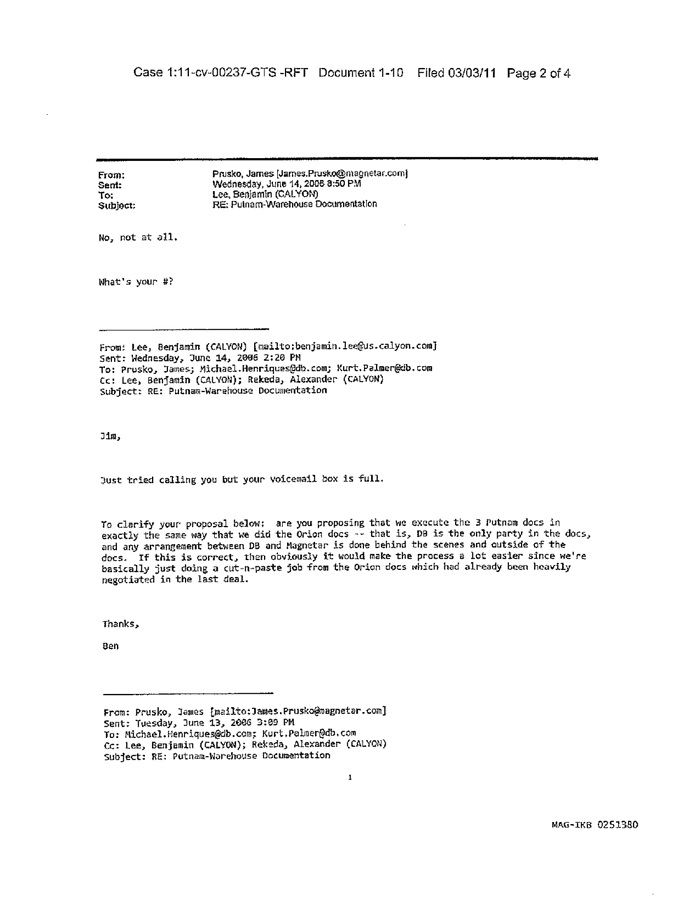As ProPublica has been detailing for two years, Wall Street banks and the hedge fund Magnetar worked together to build mortgage-backed deals that the hedge fund also bet against. The more than $40 billion of deals helped fuel the crash of 2008.
Now, recently collected emails from bankers and a Magnetar executive involved in some of the deals appear to shed new light on how they did it.
Fiduciaries threatened with a loss of business if they didn’t cooperate. Prime movers behind a billion-dollar deal suggesting they need to keep their actions hidden. It’s all portrayed in the emails, which were included as part of a civil lawsuit against Magnetar filed in New York’s Southern District Court in late June. (Our reporting is also cited in the complaint.)
The suit was brought by Italian bank Intesa San Paolo, which lost $180 million on an investment linked to a mortgage bond deal put together by Magnetar and French bank Calyon. The deal was “built to fail,” in the words of the complaint.
Boston-based Putnam was the manager on the deal, called Pyxis 2006, which involved the creation of a $1 billion collateralized debt obligation. The managers in such deals were supposed to be independent and looking out for all investors’ interests.
Intesa is suing all three players, Magnetar, Calyon and Putnam. Intesa, which is seeking unspecified damages, accuses Calyon and Putnam of misrepresenting the deal and Magnetar of acting in a conspiracy with Calyon and Putnam to aid and abet fraud. (Much of the information cited in the suit comes from an earlier case involving many of the same players that was settled.)
As with all partial document trails, the emails are open to a variety of interpretations. Magnetar says they have been selectively excerpted and that the more complete email chains don’t show what the plaintiff alleges.
The firms involved in the deal — Magnetar, Putnam and Calyon — filed motions to dismiss the suit last month.
A Putnam spokesman said, “The lawsuit is completely without merit and will be defended vigorously.” A Calyon spokeswoman declined to comment.
Magnetar is reportedly under SEC investigation. The hedge fund says it has not received a formal notice of possible charges from the SEC and calls the lawsuit “meritless.” The hedge fund reiterated that it “did not control” what went into the deals, known as collateralized debt obligations. (Read their full response.)
Here are some excerpts from the emails, with our captions:
On June 14, 2006, an executive from Calyon wonders if Magnetar’s participation should be hidden, that is, remain “behind the scenes and outside of the docs” in “exactly the same way we did” with another Magnetar CDO:
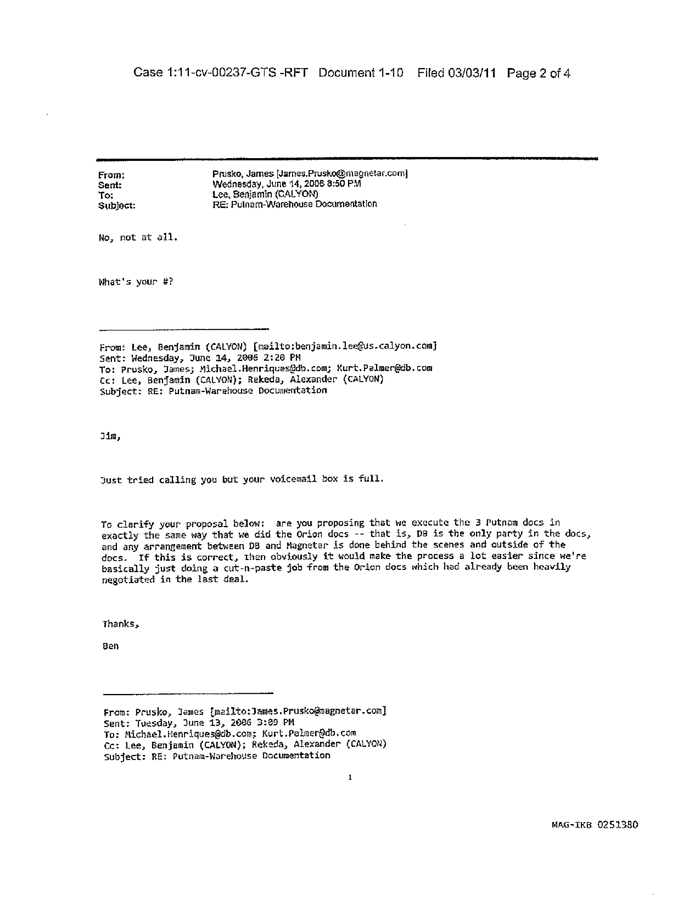
Magnetar’s Jim Prusko responds: “No, not at all. What’s your number?” Magnetar points to that response as exculpatory.
Yet a week later, Calyon, Magnetar and Deutsche Bank (which was also investing in the deal and playing a similar role as Magnetar), discussed creating a side agreement giving Deutsche Bank and Magnetar veto power over assets that were to go into the deal. Such side agreements were rare and would have left some investors unaware of important details of the deal.
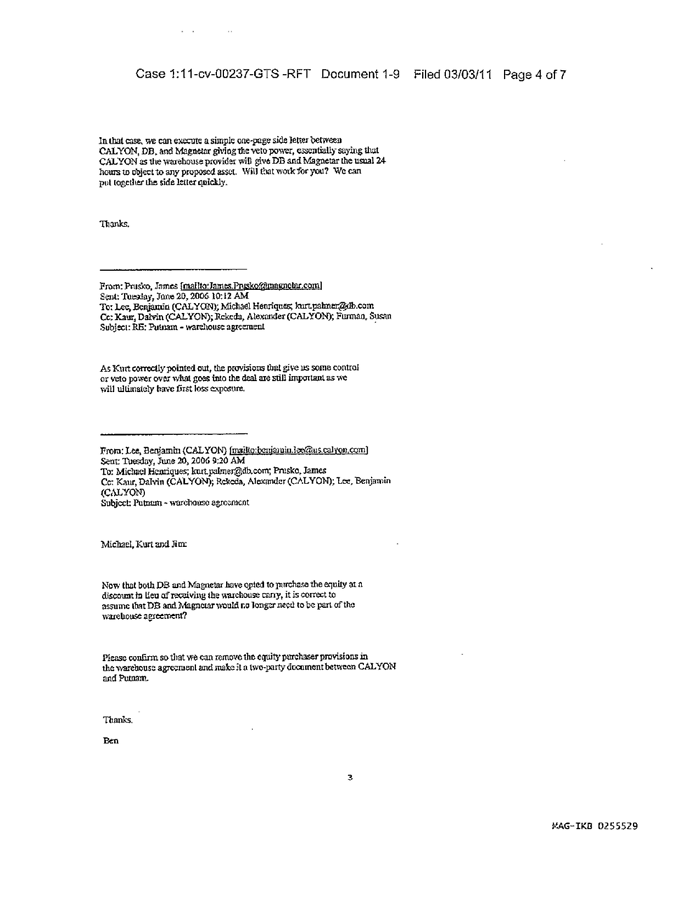
Ultimately, that side deal was never consummated, according to Magnetar. But Magnetar made sure it knew about the asset selection for the CDO, which Intesa charges is an example of its secret control. Neither Magnetar’s influence in the deal nor the hedge fund’s bet against it were clearly disclosed to investors:
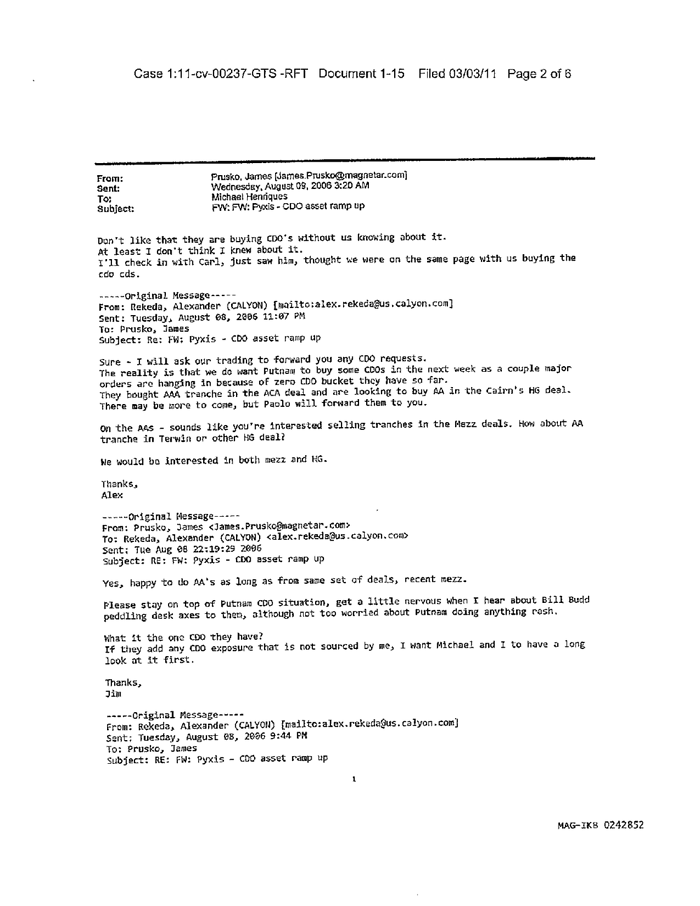
As the linchpin investor on the CDO, Magnetar needed to know what went into the investment, the hedge fund says. This does not indicate it ultimately controlled what went into the deal. Magnetar points out that Prusko, the Magnetar executive, wrote to the manager in an earlier email that the hedge fund will buy assets “of your choosing”:
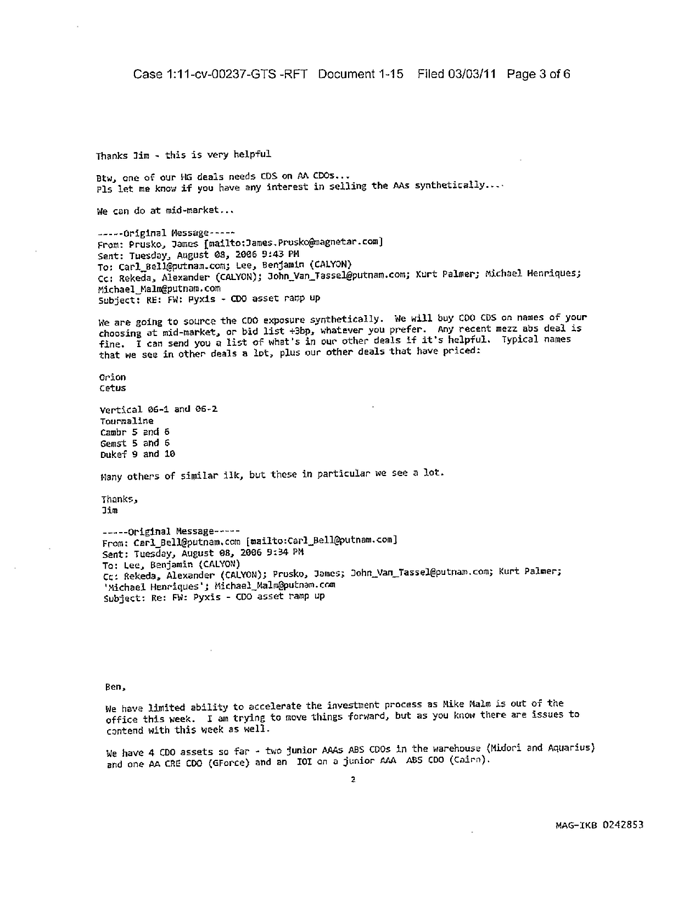
Though Calyon, which created and marketed the deal, told Intesa that it would select some better-quality, “prime” assets, none got in there, according to the complaint:
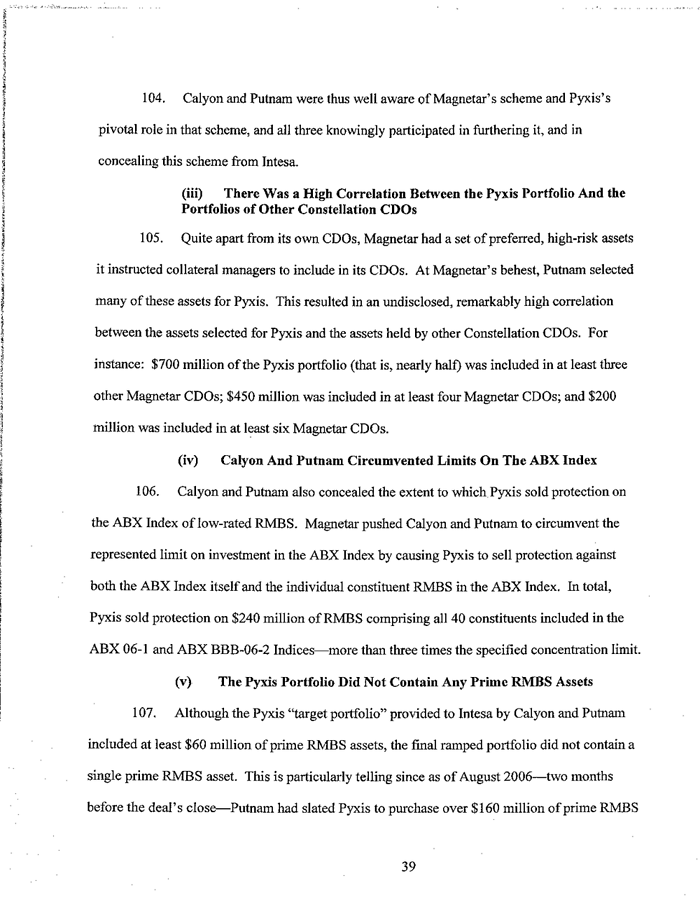
A key issue is who exactly knew whether Magnetar was betting against, or shorting, the deals in which it was investing. In one of the email exchanges, from September 2006, executives from Calyon and Putnam discuss who is shorting. The Putnam executive says: “It is definitely Magnetar.” In other words, the manager who was supposedly looking out for investors’ interests claimed to know that Magnetar was betting against the deal:
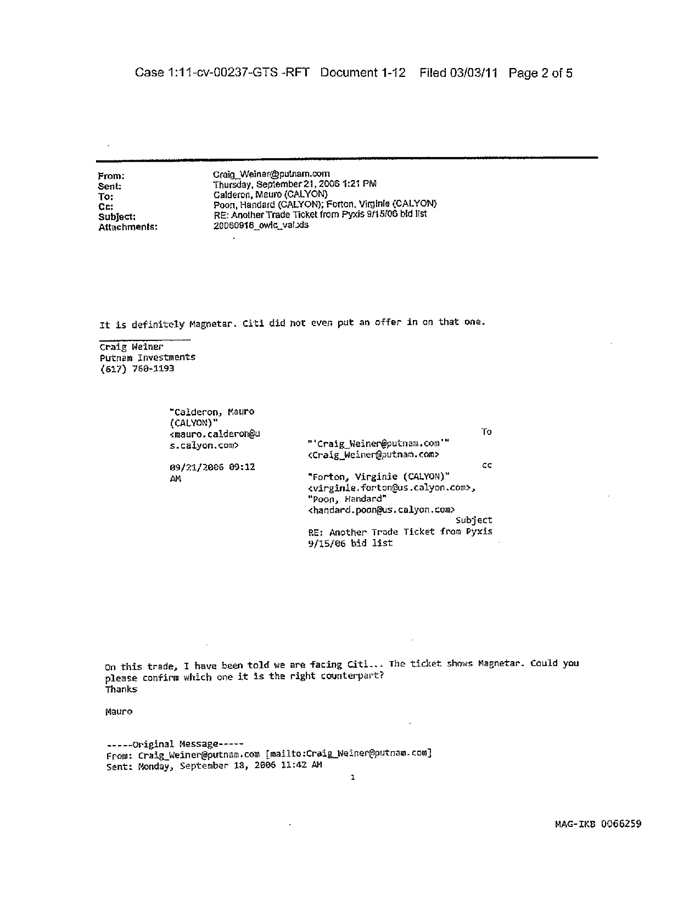
Other emails refer to a CDO manager, the Dutch-owned NIBC, which was involved in another Magnetar deal. (As we reported in 2010, NIBC once pushed back against perceived pressure from Magnetar to make a deal riskier.)
Regarding another Magnetar deal, Calyon’s Alex Rekeda writes in November 2006 that NIBC is concerned that it is ceding too much power to Magnetar and Deutsche, which was again partnering with Magnetar on the deal. He also relays another concern: “They feel very strongly that the older vintage bonds that they have in the portfolio have by far superior credit characteristics compared to the bonds they can pick up in the market now.” Translated: NIBC was feeling pressure to buy riskier bonds and didn’t think doing so would benefit investors.
(Last month, the Securities and Exchange Commission settled securities law charges against one of the players, the former Calyon banker Rekeda, accused of violating securities laws in conjunction with another Magnetar CDO. Rekeda did not admit or deny wrongdoing.)
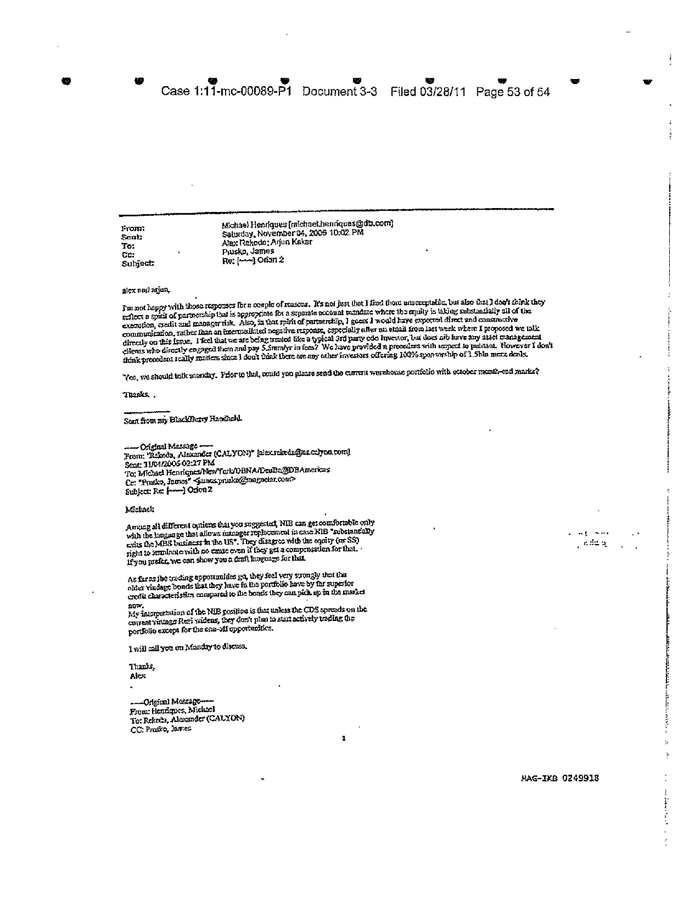
Deutsche’s Michael Henriques replies that the original investors — which include Magnetar and Deutsche Bank — are taking “execution, credit and manager risk.” That suggests Magnetar and Deutsche viewed themselves as the real managers of the CDO, not the supposedly independent NIBC. Henriques, who later went to work for Magnetar, also complains that NIBC is treating Deutsche Bank and Magnetar poorly, lacking “a spirit of partnership.”

That same day, Deutsche’s Henriques threatens to withdraw a lucrative line of business from NIBC:
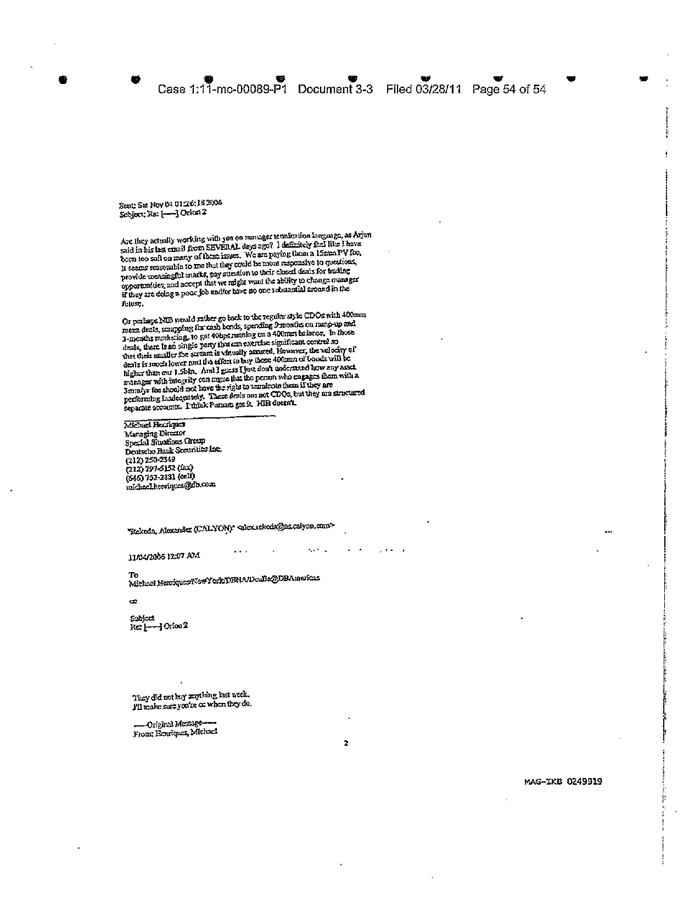
In another deal from a few months earlier, Magnetar’s Prusko had also threatened to withhold business from the manager, Putnam, if it did not “play ball”:
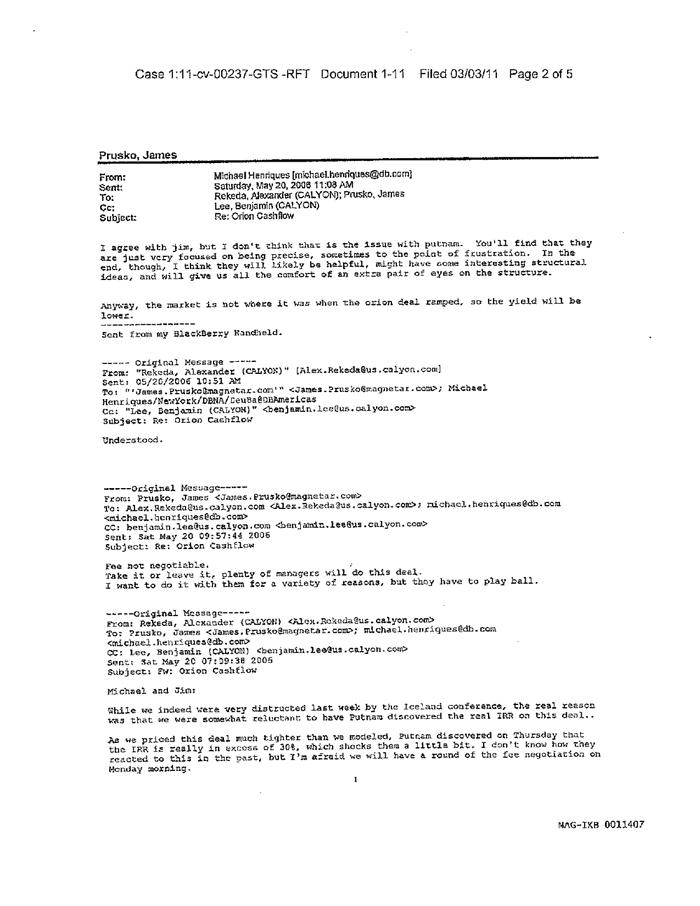
Magnetar says Prusko’s email solely refers to the fees on the deal, and not about controlling asset selection or any other issue.
In a statement, Magnetar said: “Intesa’s decision to amend this complaint appears to be little more than a transparent effort to sensationalize a baseless case in which each defendant has already moved for dismissal.
“As the Plaintiff is well aware from the motion to dismiss we filed some time ago, no Magnetar entity was a party to the credit default swap at issue in the case, and we were not even aware of that transaction until this complaint was filed.
“We continue to believe that Intesa’s accusations are meritless, and that the case should be dismissed.
“And, as we have stated numerous times in the past: Magnetar did not control the asset-selection process and our Mortgage CDO investment strategy was designed and implemented to maintain a market-neutral portfolio.”
